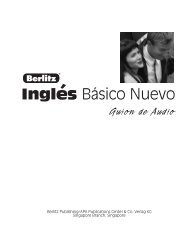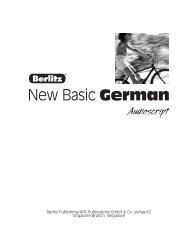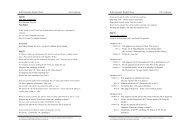Inglés Guía de Aprendizaje - Berlitz Publishing
Inglés Guía de Aprendizaje - Berlitz Publishing
Inglés Guía de Aprendizaje - Berlitz Publishing
Create successful ePaper yourself
Turn your PDF publications into a flip-book with our unique Google optimized e-Paper software.
Forma negativa: Se utiliza to be + not.<br />
18 <strong>Guía</strong> <strong>de</strong> <strong>Aprendizaje</strong><br />
Se contrae:<br />
I am not I’m not<br />
he/she/it is not he’s not/she’s not/it’s not<br />
you/we/they are not you’re not/we’re not/they’re not<br />
Forma interrogativa: Se utiliza to be + sujeto<br />
Am I...?<br />
Are you/we/they...?<br />
Is he/she/it...?<br />
Are you busy today? ¿Estás ocupado/a hoy?<br />
Is he French? ¿Él es francés?<br />
El tiempo presente <strong>de</strong>l verbo to have se forma <strong>de</strong> la siguiente manera:<br />
Forma afirmativa:<br />
I/you/we/they have<br />
he/she/it has<br />
I have a book. Tengo un libro.<br />
She has a lot of money. Ella tiene mucho dinero.<br />
Forma negativa: Se utiliza do/does + not + have. En inglés hablado, estas formas se<br />
contraen generalmente así: don’t (= do not) y doesn’t (= does not).<br />
I/you/we/they do not have I/you/we/they don’t have<br />
he/she/it does not have he/she/it doesn’t have<br />
You don’t have time. No tienes tiempo.<br />
He doesn’t have a problem. Él no tiene ningún problema.<br />
Forma interrogativa: Se utiliza do/does + sujeto + have.<br />
Do I/you/we/they have...?<br />
Does he/she/it have...?<br />
Do we have homework tonight? ¿Tenemos tarea esta noche?<br />
Does it have a cover? ¿Tiene tapa?<br />
Respuestas cortas: Se utiliza do/don’t o does/doesn’t.<br />
Yes, I do.<br />
No, she doesn’t.<br />
© <strong>Berlitz</strong> <strong>Publishing</strong>/APA Publications GmbH & Co. Verlag KG Singapore Branch, Singapore












